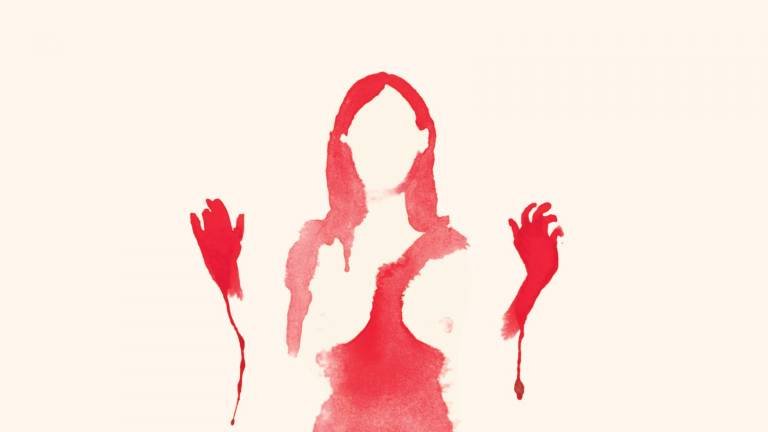“Despite being comfortable at home with my family members, I couldn’t disclose the fact that I am menstruating. For many years, I had to continue pretending to pray and take fast during my menstruation. This made me weak both physically and mentally. This only stopped only after I entered to university and started learning about my body,” says the 25-year-old Gulsom.
Menstruation is a natural yet widely stigmatized social issue in conservative Afghan society. Muslim women are banned of entering into holly places, touching holy scripture, mosques and shrines while menstruated. This socially constructed concept about menstruation leaves a totally bad consequence on mental of health of women.
The stigma of menstruation coupled with many traditional beliefs and myths, leave many girls and women in shock, pain, and discomfort when they get menstruated for the first time.
Gulsom, grown up in a patriarchal family, although apparently feels free to express her feelings, she feels certainly constrained when it comes to issue of menstruation and marriage.
Menstruation is a sensitive topic and a large number of people feel uncomfortable when they talk about it.
“Menstruation is sensitive because it relates to women’s uterus, which is considered as private. If menstruation would be bleeding from any other part of body, it wouldn’t be this sensitive,” says the 26-year-old Bakhtai.
“I was around 12-13 years old, when I firstly got menstruated. I used to live with my sister in Pakistan in a house shared with our house owner along with his many sons. I was told by my sister about menstruation and how it is considered as a taboo. As a result, I always faced problems especially when it came to usage, washing and drying of clothes that I used during my menstruation. There were times that I even used humid clothes, which is a reason for the painful cramps I am facing during my menstruation nowadays,” Bakhtai said.
Women need accurate information and sanitation facilities to manage their hygiene especially during menstrual period. Adequate personal hygiene and nutrition help girls to grow to their full potential and protect themselves from the most common health problems.
“I didn’t have cramps when I first got menstruated, but the pain starts gradually and becomes intolerable. Nowadays, when I get menstruated, I have to take 3-4 painkillers, otherwise the pain becomes unbearable. One of the main reasons for my cramps is the hygiene management, which I didn’t follow properly since the very beginning. Although, many people advise me to not take painkillers because of its negative impacts in the long run, and instead I should take food and fruits enriched with vitamins and proteins. However at this stage, except the painkiller, nothing works,” Bakhtai says.
Gulsom goes through the same problem as Bakhtai. She says, “Before I get menstruated, its symptoms alarm me. However, when I am at work, I cannot do much except to count every minute to finish work, go home, and take rest. The pain of my cramps is absolutely unbearable, which tortures me to death.”
At most schools in Afghanistan, most biology teachers avoid talking about puberty in biology class. Many parents also refuse talking about menstruation in presence of their daughters. Afghan girls also keep silent because many of them think questioning about a topic such as menstruation may create misunderstandings.
According to Bakhtai, it was always interesting for her to hear the words menstruation and ‘illnesses’, words which are usually substituted for each other. Bakhtai believes that “menstruation is not an ‘illness’ because it is part of women. It is quite normal for a healthy woman to get menstruated once in a month. It is a wrong belief to stop women from going to ritual ceremonies, religious rituals, and even in some of the family gatherings only because they are menstruated. These misconceptions are the reasons for most women to stay silent and not talk about the problems they are going through. The more the issue of menstruation is stigmatized, the more women’s problem regarding menstruation are increased.”
One of the misconceptions Gulsom was told to believe and follow was related to her fertility. She was told to not take shower during her menstruation, otherwise she will become infertile. Gulsom followed such misconception for many years, and only after she read about it, she stopped believing in it.
Insufficient facilities and lack of knowledge can mislead many girls about their bodies. Educating girls on menstruation issues helps them to build their self-esteem and confidence. As a result, they may be able to disclose their problems by sharing it with their family members, doctors, and friends, who can help them how to overcome problems. Awareness campaign about menstruation contributes to encourage healthy personal hygiene practices among women.
According to UNICEF findings, in Afghanistan, 70 percent of women follow misconception of not taking bath during menstruation by having the fear of becoming infertile; 29 percent of girls miss their schools when menstruating; 80 percent of girls are not allowed to attend social events including weddings, funerals, or going to shrines during their menstruation; and 50 percent of girls have no information when they are menstruated first.




